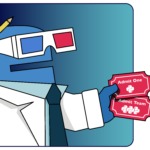 Dear Students and Friends of Enthought,
Dear Students and Friends of Enthought,
I am pleased to announce Enthought Academy—the culmination of over twenty years of teaching Scientific Python. Since our founding in 2001, Enthought has worked in the Scientific Python ecosystem, consulting in both the public and private sectors, solving hard science problems. As the creators of the SciPy package, cofounders of the SciPy conference, and contributors to Python, we have helped shape this scientific ecosystem with code, expertise, and testing. During that time, we have also provided training classes tailored to working scientists and engineers, enabling them to use these key R&D tools. In fact, over the last two decades, Enthought has trained over 10,000 scientists and engineers in the use of Scientific Python.
Along the way, we have learned a few things about the digital skills that are most useful for R&D organizations. For instance, Enthought has found that research scientists who embrace both programming and machine learning are more productive and innovative. Research progress accelerates when those closest to the problems being solved have the digital skills to quickly try out new ideas. Enthought Academy builds on this experience, putting powerful Scientific Python tools directly in the hands of scientists.
Another thing that we observed during our consulting and training engagements was that scientific researchers needed digital skills in three distinct areas of Scientific Python:
Data Analysis
The ability to comfortably use Python to collect, explore, manage, analyze, and report on data.
Machine Learning
The ability to take prepared data sets, ranging from extremely small to very large, and create machine learning models as a standard part of research.
Tool Making
The ability to create scripts, desktop applications, or web-based applications that allow a researcher to analyze problems interactively, share results, and/or enable non-scientists with minimal domain knowledge to use complex scientific workflows outside of the research lab.
We used these and other insights to reorganize and expand the courses Enthought offers. Based on the three areas of technical proficiency that we identified, we placed each course on a curriculum track: Data Analysis, Machine Learning, Tool Maker. Each track is rooted in Enthought Academy’s Python Foundations for Scientists and Engineers since the skills gained in that course are needed for all the others. Our new course line up is shown on the map below, organized into the curriculum tracks:
The remaining courses on these tracks are designed to be taken in any order (even jumping from track to track), even though we consider the order in which they are presented as the best path to follow. Every course taught in Enthought Academy is focused on building a concrete Scientific Python skill that can be used immediately in a variety of research domains.
For managers taking Enthought Academy courses, we developed the Manager Track, which provides a survey of all of our technical tracks as well as a Digital Transformation for Scientists and Engineers course. This course draws on our extensive consulting experience promoting (and sometimes rescuing) digital transformation. It introduces students to many of the non-technical aspects of digital transformation efforts in R&D organizations.
If you have any questions about where to start your learning journey with Enthought Academy or which course to take next, please contact us at upskilling@enthought.com.
Welcome to Enthought Academy!
Eric Olsen
Director, Training Solutions

Related Content
Digital Transformation vs. Digital Enhancement: A Starting Decision Framework for Technology Initiatives in R&D
Leveraging advanced technology like generative AI through digital transformation (not digital enhancement) is how to get the biggest returns in scientific R&D.
Digital Transformation in Practice
There is much more to digital transformation than technology, and a holistic strategy is crucial for the journey.
Leveraging AI for More Efficient Research in BioPharma
In the rapidly-evolving landscape of drug discovery and development, traditional approaches to R&D in biopharma are no longer sufficient. Artificial intelligence (AI) continues to be a...
Utilizing LLMs Today in Industrial Materials and Chemical R&D
Leveraging large language models (LLMs) in materials science and chemical R&D isn't just a speculative venture for some AI future. There are two primary use...
Top 10 AI Concepts Every Scientific R&D Leader Should Know
R&D leaders and scientists need a working understanding of key AI concepts so they can more effectively develop future-forward data strategies and lead the charge...
Why A Data Fabric is Essential for Modern R&D
Scattered and siloed data is one of the top challenges slowing down scientific discovery and innovation today. What every R&D organization needs is a data...
Jupyter AI Magics Are Not ✨Magic✨
It doesn’t take ✨magic✨ to integrate ChatGPT into your Jupyter workflow. Integrating ChatGPT into your Jupyter workflow doesn’t have to be magic. New tools are…
Top 5 Takeaways from the American Chemical Society (ACS) 2023 Fall Meeting: R&D Data, Generative AI and More
By Mike Heiber, Ph.D., Materials Informatics Manager Enthought, Materials Science Solutions The American Chemical Society (ACS) is a premier scientific organization with members all over…
Real Scientists Make Their Own Tools
There’s a long history of scientists who built new tools to enable their discoveries. Tycho Brahe built a quadrant that allowed him to observe the…
How IT Contributes to Successful Science
With the increasing importance of AI and machine learning in science and engineering, it is critical that the leadership of R&D and IT groups at...